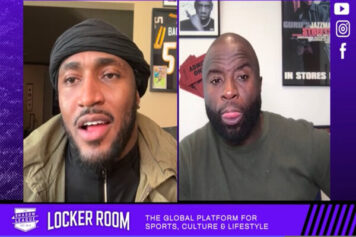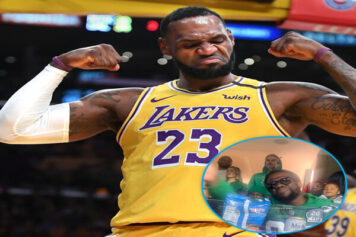Sixers President of Operations Daryl Morey is drawing a line in the sand with Ben Simmons. The relationship between Simmons and the Sixers is unsalvageable.
If we didn’t know that when he demanded a trade and refused to meet with his teammates or the franchise, then his actions at practice this week, which prompted coach Doc Rivers to kick him out and then the team to suspend him, cemented the reality some people are refusing to accept.
Morey being one of them.
Daryl Morey says the Sixers are only willing to trade Ben Simmons if they can get a difference maker in return.
He added the saga can go on "for four years." pic.twitter.com/Iz2vOiw3lq
— SportsCenter (@SportsCenter) October 21, 2021
Mental Health Problems?
Simmons reportedly has met with 76ers medical staff, Doc Rivers and teammates and he says he’s not mentally ready to return to the court. This set off a whole other issue with mental health being thrust to the forefront of athletics again.
Stephen A. Smith questioned the validity of Simmons’ claim. He says Ben is just scared to play in front of Philly fans. His co-host Kendrick Perkins says this doesn’t mean Simmons has “mental health issues.”
The bigger issue, as far as the players and owners are concerned, extends past one player.
Player Empowerment vs. Old School Capitalism
The issue of player empowerment has been something that has been at the center of battles between the players and owners. This disconnect has been fueled by racial tensions in the country and the reactions of the players and owners towards white cops killing numerous unarmed Black people in the line of duty.
George Floyd was the catalyst, but the shift in the NBA’s corporate culture has been going on ever since LeBron left Cleveland for Miami, teamed up with his boys and changed the face of free agency forever.
That’s really what the 2021 Lakers are; a hang out group for friends who want to spend their last years around their boys.
Perkins offered some keen insight on the Ben Simmons situation. It’s deeper than basketball. Perk describes it as a moment of truth of sorts for the relationship between owners and players.
Owner vs. Players
“If anyone thinks for a moment that owners around the league are aren’t talking about this situation in house and telling the ownership of the Philadelphia 76ers to stand their ground , they’re crazy,” Perk said. “This is about making a statement more so than anything else”
Stephen A took it back further and went a bit deeper.
“When LeBron James announced that he was taking his talents to Cleveland, remember the firestorm that created,” Smith asked. “I’m not talking about amongst fans…I’m not talking about Cleveland. I’m talking about (owner) Dan Gilbert. You had a lot of owners who were turned off because Dan Gilbert was never given a heads up (that LeBron was leaving) and they had a problem with how LeBron James handled his departure with Cleveland.”
That was a damaging blow to an impenetrable wall of control that owners once held over the future of superstar players.
Back in 2019, when the Lakers and Lebron were maneuvering outside of the usual sphere of business and empowering Black athletes and players to gain more control over their careers, the owners hated it. LeBron was already on step 20, by the time the owners realized how he was changing the game.
This excerpt is from a Shadow League article written in 2019 when Rich Paul had the owners scrambling to find a way to eliminate him from the mix because he and LeBron were changing how business is done in the NBA.
“Klutch Sports CEO Rich Paul and LeBron James are major threats to the current NBA power structure. The owners (and other agents on the low) are pushing the league to do something about it, while social media fuels the fire and mainstream media feeds right into the hype.”
Amazing level of reporting here from @joevardon to identify The Who and How that is involved in steps LeBron is taking to become an NBA owner when he’s done playing.
Talked to LeBron, Magic, Rich Paul, and others and laid out the plan, comparing it also to what MJ went through https://t.co/mbcF57L8kH
— Sergio Gonzalez (@thatgonzalez) February 14, 2019
“Reports surfaced that owners were even concerned about NBA All-Star weekend, where the league’s elite performers would all be congregating, fraternizing, partying and discussing dreams and hopes — maybe even planning the next coup d’é·that.
It was a convergence of Black power that would make any oppressive capitalist cringe.
LeBron and Paul’s media and business empires are well documented and their power play with trying to help force Anthony Davis to LA has been lauded as black player empowerment and criticized as dirty pool.
Players recruiting players is nothing new.
But when the black man turns the table on the system, people are going to have a problem with it. The accepted narrative is that Rich Paul, Magic Johnson, LeBron and Anthony Davis constructed The Brow’s attempted LA bailout way in advance… which is technically against the rules. Tensions and fears among owners around the league continues to build.”
Bigger Bag, Less Player Control
In the NBA’s new climate — where African-American superstars are forcing trades, creating Super Teams and using a temporary leverage to create the perfect situation — team owners (are shook).
Two years later and owners have more money than ever, but less control over the lives of their superstars. The league has made the consequences for tampering harsher in an attempt to slow up the player empowerment, but no one can stop evolution.
The Ben Simmons situation isn’t the first case where a star player wants to force a trade. Kawhi Leonard did it in San Antonio after winning a championship there. Kyrie wanted out of Cleveland and they obliged him. The recent list of stars getting their way is plentiful.
However it seems that the owners have chosen to draw a line in the sand with Ben Simmons attempting to leave with four years left on a huge contract.
Morey says he’s willing to wait this out, but he sounds ridiculous. A few months of this battle has already exhausted the fans, media and Philly’s star Joel Embiid. Social media is loving the drama.
Reporter: Daryl…why haven’t you traded Ben Simmons yet? Don’t you think it’s time to move on?
Daryl Morey: pic.twitter.com/NvC3LJrUvu
— Colb (@___Colb___) October 21, 2021
Strong Arm Tactics
Morey is trying to force Simons back on the court, which is the worst thing in the world to do when you’re trying to build team chemistry. The city of Phillyis being held captive by this personal beef and the Sixers trying to teach Ben Simmosn a lesson.
Daryl Morey, in a Philadelphia radio interview, confirming what's been widely believed: He will not be pressured into trading Ben Simmons. "People should buckle in," Morey said. "This is going to go a long time."
— Chris Mannix (@SIChrisMannix) October 21, 2021
Or maybe it’s that serious for the owners who continue to see the old way of business become a thing of the past.



